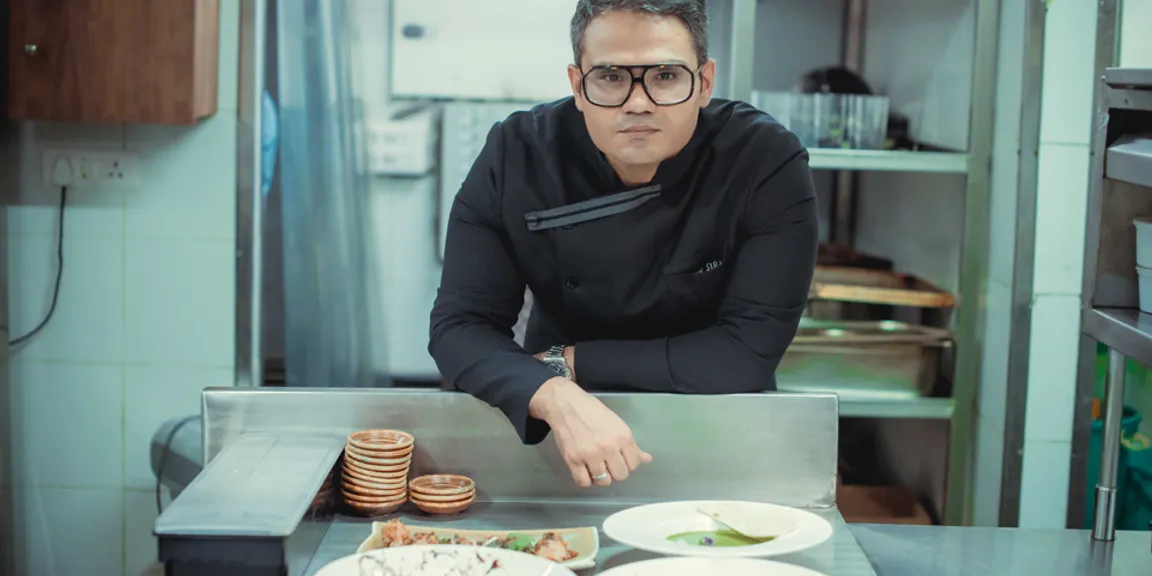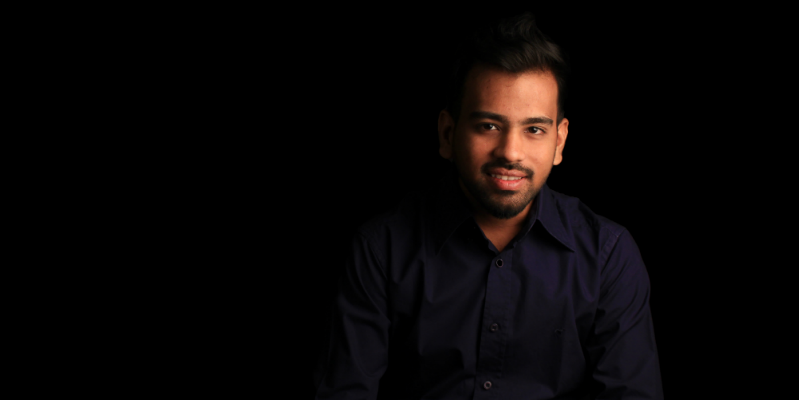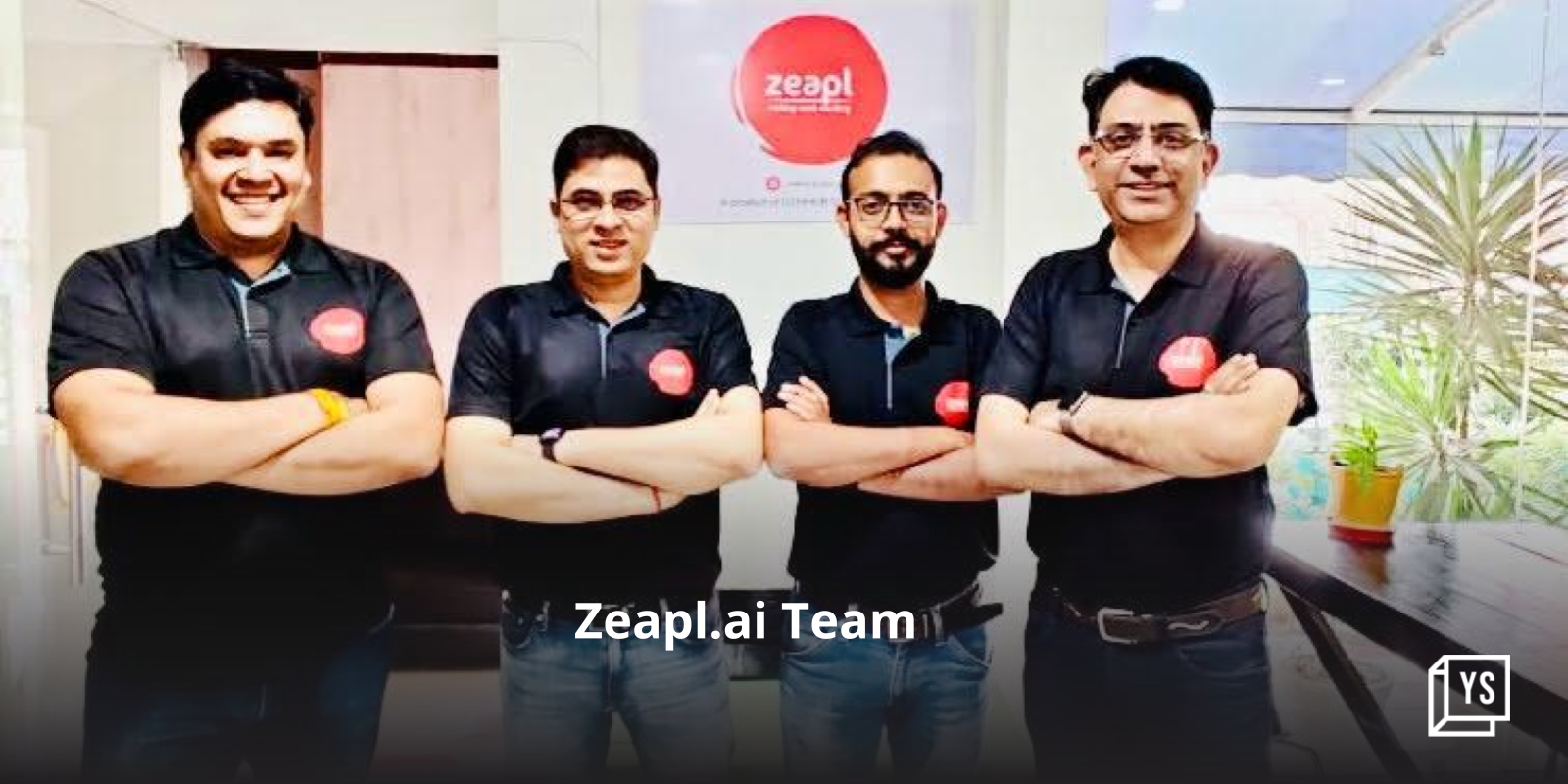One fine meal: Chef Tarun Sibal talks about the future of restaurants and the culinary industry after the lockdown
Renowned chef Tarun Sibal who has founded award-winning restaurants across the country tells us how the food and beverage industry will change after the lockdown is completely lifted and all about his culinary journey so far
Whether it is adding the final touches to a plate of mushroom Vol au Vent, or crafting the intricacies of a Chocolate Semifreddo or rustling up a pot of Duck Madras curry, Chef Tarun Sibal works with the precision of an artist. He is meticulous about plating, pays great attention to flavour and is known for his authenticity and incredible talent.
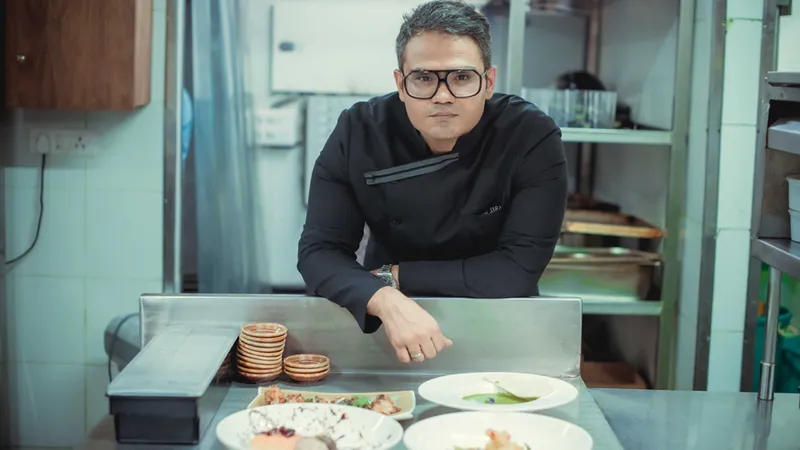
Tarun Sibal
With 18 years of experience behind him, Tarun is a product specialist with core competence in food and beverage category, across production, operations, formats, food heritage and food and liquid culture.
An IHM Pusa alumni, he started as a management trainee at the India Habitat center in 2003. A designation of a Sous chef, and an MBA later, he ventured into food and beverage marketing helping Indian and international brands and international food boards setting up shop in India.
He is also well versed in wines and specialised spirits. He has worked closely with top wine houses across the globe, brought the Bordeaux wine school to India, spearheaded the marketing and sales department at Fratelli wines and worked with the Mezcal Producers association to get Mezcal into the country.
Today Tarun is a chef entrepreneur, as he is culinary director and co-founder at One Fine Meal, an award-winning catering firm. He is also co-founder at Café Staywoke, which was voted as the best cafe in Gurgaon where his gourmet casual interpretation of global and Indian cuisine was greatly appreciated.
Street Storyss, his global vegetarian street food inspired restaurant in Indiranagar, has won three awards, including the best R&D. Tarun’s latest offering “Titlie” is a culinary bar in Vagator, Goa where his collaborative cuisine takes center stage.
In an exclusive interaction with YSWeekender, Tarun talks about the future of the food and beverage industry, his culinary journey so far and more…
Edited excerpts from the interview
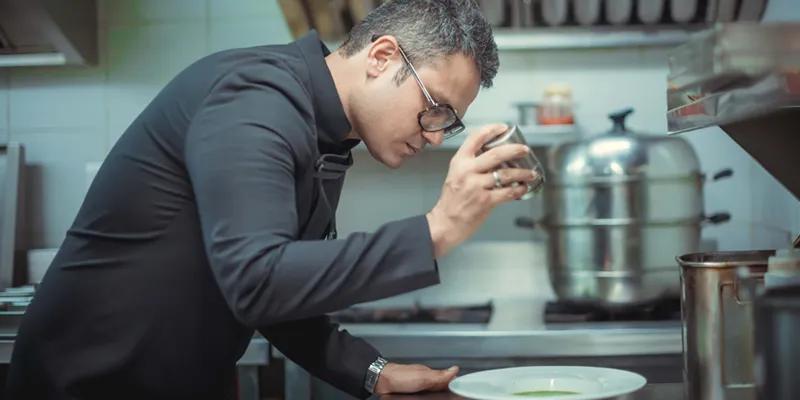
Tarun believes in precision, flavour and artistry
Tell us about your culinary journey?
It started with my gene pool as I come from the first catering family of Delhi. Being part of a food family helped but the gene pool was not the only reason for me to be part of this wonderful fraternity. All I wanted to do was to be in the food business, as a chef, a marketer, and as an entrepreneur.
I started my culinary journey in the year 2000 at IHM Pusa Delhi. The three major milestones of the first phase of my professional life were being an Industrial trainee at the Oberoi, a Management trainee with the Habitat World and a Sous chef in 2006.
The experience of working and learning with the best chefs at the Habitat World became the core of my food sensibilities. Having said that, my food dream was bigger than being confined to a kitchen hence in 2006 I pursued my MBA and ventured into Marketing of food and beverage, conceiving brand stories, and laying out a path to the market for food and beverage brands.
During this phase, I had the opportunity to work with 3 international food boards, Bord Bia (The Irish Food Board), Sopexa, (The French Ministry of Agriculture and Fisheries) and MLA (The Meat and livestock Association of Australia) and understand how countries take pride in their indigenous produce.
The last leg of the second phase was surrounded by wines and specialised spirits as I took charge of the sales and marketing office at Fratelli wines in 2011 followed by being the country manager at Berentzen Spirits in 2014.
And then in 2015 lighting struck and I was back where I belong. I left the corporate world to reiterate the family’s catering business and that’s when One Fine Meal saw daylight. A year later I had the opportunity to open my first café and Café Staywoke opened its door for guests in November 2017.
At Sidecar and Loft, you’ll have my food signatures and these were launched in 2018 and 19 respectively to great accolades. 2019 also brought in focus, Street Storyss Bangalore, my multiple award-winning restaurants, providing vegetarian, street food-inspired dishes.
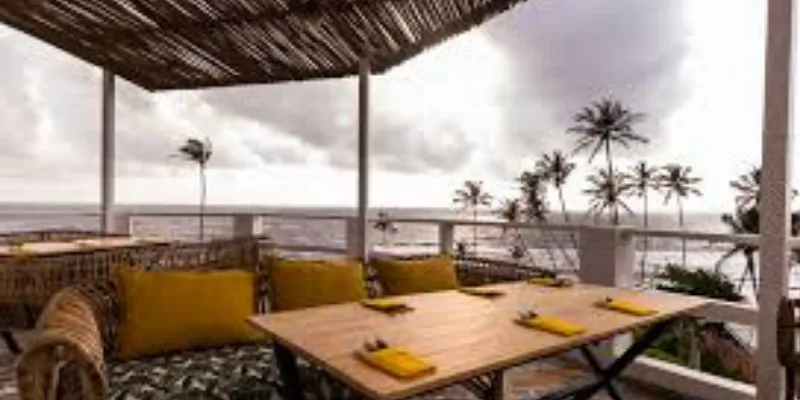
Tarun's culinary bar, Titlie is located in Goa
Finally, 2019 saw the birth of “TITLIE” Culinary Bar in Vagator Goa, based on collaborative cuisine and my most prestigious product so far, Titlie opened to packed houses and got unprecedented love from the audience.
How have you managed your restaurants during the lockdown? What has happened to the restaurant industry as a whole?
All my restaurants across, Delhi, Bangalore, Goa, and Gurgaon are still closed and will only open once the centre and the state provide the necessary clearances for food and beverage establishments to open for business. Our industry was the first to be closed and will be last to open.
The first step for us was to safeguard the interest of our employees and staff members, be it food, shelter or medical requirements. We are sitting tight and keeping our fixed costs in check so that we have the necessary impetus when we are back in business.
The restaurant industry has seen its worst crisis ever and the road ahead is full of obstacles. From the opening till normalcy prevails or till the viability goes back to a reasonable level it will be a long journey.
Post COVID-19 we are looking at new rules of engagement and there won’t be a single mantra that will work. Consumer behaviour is the key, and two schools of thought are prevailing one suggesting that the consumer will become extremely conservative and the other suggesting that COVID-19 has given a new meaning of life and people would want to make the most of what they have.
Food and eating out gives joy to people it creates memories for a lifetime. In today’s world our conversation usually revolves around our last meal, I am optimistic that if we are able to survive the onslaught, we will return stronger within a period of a year.
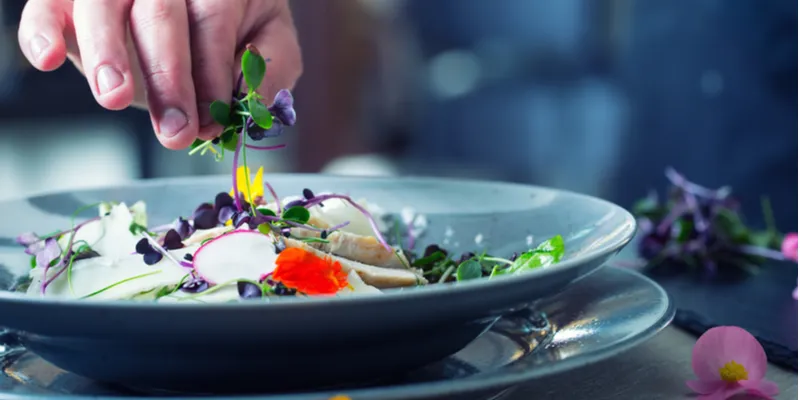
Food and eating out gives people a lot of joy
No matter how much optimism I may have, the sector is going to see a considerable percentage drop of customers. We will need to make the consumer comfortable with the idea of dining outpost the COVID scare, and would need to make it safe to the best of our ability.
Professionally the food and the beverage industry will see a version 2.0 and we are gearing up with tools and techniques to make eating out viable once the lock-down finishes. Safeguarding the interest of the consumer, the community, the team and the business will all be equally important.
We need to work in collaboration and a fraternity and put a brave front. It won’t be easy though.
There are 6 billion dollars at play (the business) and roughly 8 million people employed (and their families dependent) in this sector. And unlike any other function our skill set is so meant for hospitality only. For e.g. sales personnel today selling insurance can now sell white goods, but a person working on the tandoor will only work on the tandoor.
What were some of your culinary initiatives during the lockdown?
We started a massive training drive for almost 100 of our staff members and food handlers covering Hygiene and Safety protocols so as to ensure that the team has the necessary inputs for being responsible citizens and to understand COVID compliance.
We also discussed and shared ideas new product lines, on how to operate with minimalistic touch points and yet provide an awesome experience for our guests. All this was enabled by E-learning and technology. Keeping the morale of the team-high was another big challenge we faced and that where your personal leadership style comes into place and I am thankful that I was able to keep my team in the groove.
For the Community, especially from my Catering Brand One Fine Meal that boasts of 6000 square feet kitchen we distributed roughly 10,000 meals during the course of the last two months.
What do you think will be the trends in the F&B space that will happen after the lockdown?
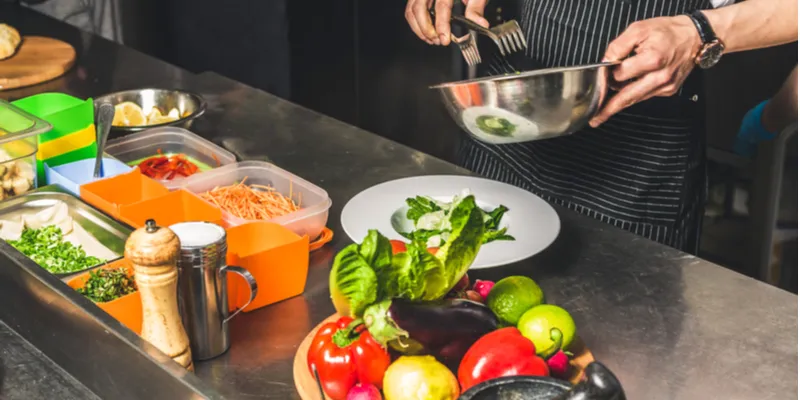
There will be many changes in restaurants after the complete lockdown is lifted
We will see the initiation of contactless dining, well not in the literal sense, you will still have a plate and you will have to eat, but various touchpoints will be eradicated, like being presented with a menu, being presented a bill, etc. This will all be done digitally. We will also see smaller menus, many dishes that are suitable for delivery, automation in the kitchen, less manpower so on a so forth.
Dining in will become big across all segments of restaurants, and people will order pizza from La Piazza and from Dominos. Restaurants will boast about hygiene rating and food safety procedures. I feel coffee shops, casual dining restaurants will be the flag bearer for the resurgence as guests might take more time to be back to luxury restaurants, clubs, and high-end bars.
Street food will also take a huge hit, the humble Gol-Gappa cart might be a thing of the past, as quality and hygiene will be a key tick mark for consumers. This also means that there will be an opportunity for street food to come into mainstream dining concepts.
Can you give three secrets to home cooks to create a delicious meal?
The three secrets are:
- Don’t cook in a hurry. One should always have time and cook slowly.
- Trust your senses more than the recipe. We should know that once we create something likable only then a recipe is formulated not the other way around.
- Be ready to experiment and be ready to fail. Each successful dish is a result of many that were not up to the mark.
Which cuisine has been most popular in India of late?
Collaborative cuisines will prevail. I believe great chefs are great human beings with great characters and that character is what distinguishes their food from anyone else’s. And it’s this character that will be featured in the menus.
Regional and micro-regional cuisines are being explored a lot along with area-specific international cuisines. So, it will be Mangalorean or Sicilian instead of South Indian or Italian.
How did you spend your time during the lockdown? How do you plan to experiment more with food in the days ahead?
The Crisis has had a cumulative impact on every individual not only on the professional front but also on a personal level. The future of what will be the new normal is the big question. What, when, how will we arrive at a world that was or we will enter into a new world.
I coped, by taking it one day at a time, keeping close to my loved ones, doing things together, catching up on time, reading, just restarted 40 rules of love, cooking, shooting videos, learning (have enrolled in an online course) and finally just laying low to conserve energies. It is best to treat it like a forced hibernation so that when the time is appropriate, we come out with full vigour.
I have also worked on my skill and the knowledge that I have worked on during this time of crisis, be it getting myself equipped with the best in class safety procedure for my industry, Re-learning my FSSAI certification program and developing customised models for my restaurants or looking at the work of my fellow chefs, entrepreneurs, industry experts for inspiration.
On the food side of things, I have already finished the new menu for Titlie during the lockdown, and I am about to finish the new one for Street Storyss. Have diversified the Café Staywoke Offering and launched the gourmet frozen burger patty range. I guess all this a lot and I may need a vacation after this lockdown.
What do you think of the concept of farm to table?
Farm to fork is a brilliant concept, but it is in its nascent stage in India. We not only work with producers directly but also work with institutions and suppliers who consolidate a group for farmers and get us the freshest seasonal and local produce. I am personally a part of the Young Chef’s Association that works directly with farmers to promote farm to fork and celebrate the indigenous produce of the land.
What would be your advice to aspiring chefs who are looking at making a career in the food industry?
My advice to aspiring chefs will be to have Tenacity, Grit, Hustle, and integrity. If these are not your strong suits, think twice before you enter the industry. You should love your life in the kitchen or in the restaurant and only then you will be able to perform and excel.
What are your ultimate comfort foods?
I am a man of very strong and limited likes, and I keep having the same things again and again. And though I experiment a lot with food when I eat out, it boils down to a well-made Hummus and a Besan Chilla that my Mom cooks, two of my ultimate comfort foods.
What is your food philosophy?
My food philosophy is to serve “warmth” on the plate and serve “Joy” on a plate, as the intent will matter the most when you are laying out food. Also, that no substandard ingredient will turn into quality produce is what I believe in.
(Image credits: Shutterstock, Architectural Digest, India)

